- Home
- Alex Archer
Rogue Angel 54: Day of Atonement Page 2
Rogue Angel 54: Day of Atonement Read online
Page 2
“Fine. I’ll begin my story by telling everyone how I’ve been muzzled. That makes for a compelling beginning. How someone—you—didn’t want this story out in the public domain. That just makes it more interesting, doesn’t it? Think about it. The fact that the truth is being suppressed is more interesting than the truth itself. Why would you want this kept secret unless you had something to hide? You can try to ridicule me and make me look like a fool, but I won’t be silenced. There are other ways to tell this story. This is the modern world now. Information wants to be free. There are bulletin boards and chat rooms that would devour this type of thing, giving it a life of its own. All I have to do is log in and start to tell the world everything I know. It’s not about money anymore. It’s about the truth. You’ve misjudged me, Mr. Roux, if you think that all I care about is money. I didn’t turn up on your doorstep trying to blackmail you. I came looking for answers.”
“And that was a mistake,” Roux said, then hung up.
Moerlen was right; the world was changing, and changing faster than it had for decades before. It was already smaller than it had been even twenty years ago with the pernicious invasion of television, but now with so many people having access to computers and those machines somehow connecting like some giant message network, it was so much more dangerous for a man like him.
This was escalating too quickly. The risk now was that it would slip out of his control. There were strings he could pull, more favors he could call in, but once the story had a life of its own there was no way he could put that genie back in the bottle. And that was what those bulletin boards and chat rooms promised to do.
Which meant he had to find another way to stop the story.
He needed to speak to someone who understood this electronic world, and the very real damage that could be done if he were to be exposed. There was one obvious choice, but given that they hadn’t talked for longer than Moerlen had been alive, it wasn’t exactly an easy call to make. The last time they’d been together Garin Braden had tried to kill him. The same thing had happened the time before. A third time and he’d start to take it personally.
He dialed the number, but he was forwarded straight to voice mail.
“Call me,” he said, then hung up.
There was nothing more to say.
Garin—his former pupil—would recognize his voice, and understand just how important it was that they talk simply because he’d swallowed his pride and reached out.
He thought about ignoring the situation and hoping the mess would just go away. The more he fought against it, the more obvious it was he had something to hide, after all. But what if it didn’t go away? What if those damned photographs led to more journalists banging on his door, asking more and more questions he couldn’t answer? He hadn’t asked for this life, even if, looking around him at the riches he had assembled across the centuries, it might look like a blessing rather than a curse. All it would take was the wrong person digging deep enough and everything would begin to unravel. The last thing he wanted to do was to have to begin a new life somewhere else. It was getting harder and harder to do that in this era of powerful computers and international cooperation.
His world, and Garin’s, was in danger of falling apart.
He punched a number on his phone again.
“Mr. Moerlen,” he said before the man on the other end of the line had had a chance to say hello. “You are right, we should meet. I will be in Paris in a couple of hours.”
“I’m so glad you’ve come to your senses, Mr. Roux. But things have changed since the last time we spoke.”
“How so?” Roux asked, not liking the sound of this.
“Remuneration, Mr. Roux.”
“Ah, so despite all of your protestations, this is about money, then? I’m disappointed.”
“Don’t be. I’m a child of the modern age. The modern age, as I’m sure you have noticed, is an expensive place to live. Let’s make it the top of the Eiffel Tower shall we?”
Moerlen named a time and hung up.
Roux wondered how much this was going to cost him. It wasn’t that he didn’t have the money. He had plenty of money, but would it ever be enough to guarantee his privacy? Pay the blackmailer once and then what? Expect him to be good for his word and never turn up on the doorstep again looking for another handout? Blackmail was a dirty business. There could never be an end to it.
Which, unfortunately for Moerlen, meant it needed to end very differently.
* * *
IT WAS A long climb.
There were a dozen tourists already on the viewing platform by the time Roux reached it.
There was no sign of Patrice Moerlen.
Roux’s plane had been refueled and would be ready to leave Orly Airport at a moment’s notice if things went the way he assumed they would. He would need to distance himself from the city for a while. A glance at his watch, an eerily precise Patek Philippe chronograph, showed that he was almost five minutes early. He hated to be early for anything; time spent waiting around was time wasted. Perhaps it was because he had so much of it he hoarded it?
A couple of tourists glanced in his direction, no doubt wondering why he had made the dizzying climb up the iron stairs and wasn’t leaning over the rail to take in the view across the city.
“Are you afraid of heights?” a small boy with a thick American accent asked him. “You can’t fall out you know. You’d have to climb and jump because of the railings, so it’s really safe.”
Roux forced a smile.
“That’s good to know.”
The boy’s mother took hold of his arm and pulled him away, muttering something about not talking to strangers.
Roux checked his watch again. Ninety seconds. Still no sign of Moerlen. And no sign of him on the stairs below, working his way up to the platform. This wasn’t good. He couldn’t control the situation. He didn’t like it when he couldn’t control the situation. The elevator doors opened behind him.
Another handful of tourists emerged, but the journalist wasn’t among them.
As the last of them stepped onto the platform, his phone rang.
He still wasn’t used to the fact that technology had advanced so quickly over the past few years that it was possible to carry a phone around wherever you were in the world, even if reception was patchy.
“Where are you?” he asked.
“I’m at the foot of the tower.”
“I’m not in the mood for games, Mr. Moerlen. You said the observation platform,” Roux said. “I am on the observation platform, you are not. How am I supposed to trust you if you can’t even keep this simple agreement? This does not auger well for our relationship.”
“What can I say? I changed my mind. I wanted to know how serious you were. Now I know.”
“Serious? I’m trying to save you from wasting any more of your life, and in the process ending your career, but it looks like you are intent on leading me off on some wild-goose chase. I don’t appreciate being treated like an idiot.”
“Save me?” Moerlen had the temerity to laugh at him. “Save yourself, you mean. You misjudged me, Mr. Roux. It was never about the money. I’ve only ever been interested in the truth. And you’ve just given it to me. Goodbye.”
Roux pressed against the viewing window, knowing there was no hope of being able to spot the damned journalist so far below.
People milled around like so many ants on the ground below. He’d read somewhere that if a person dropped a centime on its edge from this height it would cut through a man, splitting him in two. He had a problem. If he didn’t do something about Moerlen now, he might not get the opportunity again before it was too late. He had to stop that story getting out. His privacy afforded him a certain standard of living. Exposed, his life could never be the same again. It really was as simple as that. Moerlen, consciously or not, had forced his hand.
Behind him, the elevator doors began to close. He moved quickly. Two strides, three, and he reached out, sliding his
hand between the doors before they could shut. He stepped inside. The silence was punctuated by the occasional disapproving tut from the woman whose boy had spoken to him before.
Roux said nothing.
He waited out the short descent, then pushed his way through the doors before they were fully open, elbowing between the next wave of tourists eager to make their way up to the observation platform without the climb.
He couldn’t see Moerlen; not that there was any guarantee the journalist had ever been there, no matter what he’d said. But if there was the slightest chance he was there, maybe watching from the safety of a nearby café to note how Roux reacted to his taunt, he had to try everything he could. If the guy wanted him to beg, then he’d beg. If he wanted to negotiate some exclusive deal to his story, then he’d negotiate it, but only if he could control it. That was what it was all about now—control.
He tried the journalist’s number again, listening for some telltale ring and all the time he turned through three hundred and sixty degrees, scanning the faces around him. Moerlen didn’t answer.
But Roux could hear a phone ringing.
He moved his own cell phone away from his ear and started to walk toward the sound.
He pushed through a family, barging between mother and father and sending the kids scattering. The commotion caused heads to turn. Roux saw one in particular, a reflexive glance followed by the fight or flight instinct kicking in.
The man ran.
“Wait!” Roux shouted.
More heads turned in his direction, everyone in the crowd thinking the call was for them.
The man didn’t stop.
He ducked his head and quickened his pace, pushing through the gathered tourists as he aimed for the open spaces of the square and the streets beyond where he hoped to disappear.
Roux tried to keep up with him but people kept getting in the way, clustering around the shadow of the tower, seemingly oblivious to the rest of the world. He shouted again, his voice carrying over the heads of the tourists, but Moerlen had worked himself into open space and began to run.
He had no intention of talking.
Moerlen offered another frantic glance over his shoulder to be sure he was leaving Roux behind. There was nothing the old man could do. He couldn’t keep up. In that moment, caught looking back, Moerlen’s foot slipped and his ankle turned as he reached the road, stumbling on the curb. He couldn’t stop himself as fear had him staggering out into the line of oncoming traffic.
A horn blared, harsh, panicked, but it was too late.
Bones and metal met in a collision. There could only ever be one outcome.
The car—a blue Peugeot—slammed on its brakes and started to slide. The car behind it, slower to react, rammed into its trunk to a cacophony of crunching metal and breaking glass.
Moerlen was the only one who didn’t make a sound.
But then, dead men had little to say.
Roux watched as people rushed toward the journalist, the first few to help while others gathered around, horrified. Roux heard someone call out that he was a doctor, the words parting the throng like the Red Sea to allow him through. Roux followed in his wake, knowing that the idiot was dead. It had never been meant to end this way. Yes, he had wanted him stopped, but he hadn’t wanted him hurt.
A woman in a heavy knit cardigan knelt over Moerlen, her hand on his throat.
She looked up at the crowd.
There was a moment when she might have said anything else, when it could have played out differently, but then she told them, “Il est mort.” And it was final.
Roux had known it from the angle of the fall, the way his body twisted on the black surface of the Parisian road.
This wasn’t what he’d wanted. All he’d wanted was a quiet life, the journalist out of it. Peace. It wasn’t a lot to ask, just to be left alone.
Roux heard the Doppler-effect sound of sirens approaching, still streets away. Someone had to have called for help. The crush of bodies eased, people moving back as if the man’s condition might be contagious. The doctor knelt beside the body.
There was a briefcase lying in the middle of the road, having spun out of the dead man’s grip.
The photographs were almost certainly still inside.
Moerlen had been emphatic that they weren’t his only copies. It was irrelevant if they were or weren’t. If the police opened that case and saw all of those versions of the old man’s face, it could only lead to questions. Roux worked his way around the crowd to the briefcase and picked it up, careful not to draw attention to himself.
As the paramedics arrived, he slipped away through the slowly thinning crowd.
3
On a winter’s night
The present
It was minus seven degrees, closer to minus fifteen with the windchill factored in.
The extreme conditions presented their own problems for filming, including static discharge ruining shot after shot. It was just bone-chillingly cold, and Annja Creed was going snow blind with the swirling flakes twisting and churning in the air as they turned the world to white.
They were outside the tent, standing in the last bluster of the storm. An hour ago it had been like Snowmageddon out there. Now, there was air between the flakes and she could see the high walls of the castle, meaning it was the perfect time for the establishing shot of the medieval site in the heart of winter.
Annja had visited Carcassonne before, more than once, but on her previous visits the weather had always been positively tropical in comparison.
“You ready to go again, Annja?” Philippe Allard, the cameraman, asked, hoisting his camera onto his shoulder.
“Let’s do this,” she said, moving back into position.
On her mark, she waited for the thumbs-up to say that she was good to go.
She took a deep breath, letting it leak out slowly in a mist that wafted up across her face and earning her a scowl from her cameraman. His thumb went up. Annja started talking to the camera as if she hadn’t taken a three-hour break waiting for the worst of the storm to pass. An observant viewer might spot that the snow on the hillside was deeper, but their brains would quickly fill in the gaps and gloss over that inconsistency.
She knew that chunks of the footage would be cut, with other images overlaid on the soundtrack. They’d gathered plenty of fantastic material over the past couple of days. And honestly, once she was back in the studio, a fair amount of the commentary would end up being rerecorded because she was a perfectionist and couldn’t stand to watch a segment that was any less than that. So yes, you put in the work on location, but you did it knowing that, when it was all edited together, some of it would end up on the cutting room floor. Subzero conditions or no.
“Overlooked by the medieval fortress, the Cité de Carcassonne, the land behind me, has been the site of a settlement since Neolithic times. The Romans were among the first to really capitalize on its strategic position, and occupied the same hilltop until the fall of the Western Empire and the incursion of the Visigoths.” She missed a beat as the red light went off, and the cameraman lowered his lens.
“Something wrong, Philippe?”
“Don’t take this the wrong way, but don’t you think it’s all a bit…” He shrugged.
“Weak?” Annja suggested. “Sloppy?” She inclined her head. “How about dull? Or, heaven forbid, boring?” She folded her arms in front of her and shifted her weight, waiting to hear what he had to say.
“Wordy,” Philippe said eventually, making it sound like one of the greatest crimes that could possibly be perpetrated on TV.
She grinned. “Wordy?” Wordy she could cope with. Wordy was just another way of saying that she was talking too much and using long words. Sometimes long words were just fine. It wasn’t like she was about to parade around in a bikini trying to sex-up history in the snow.
“Want to change places?” Her grin was sly. “I’m happy to have a go behind the camera. I’m sure Doug would approve.” Doug
Morrell was Annja’s producer.
“Well, my mom always said I had a face for television.” He grinned right back. “You know, what with the whole sun shining out of my ass thing, I’m definitely special.”
“No arguments from me.”
She held out her hand for the camera.
“Are you serious?”
“Why not? Consider it your audition tape.”
“More like the Christmas gag reel.”
Even so, Philippe handed over the camera and waited on the mark while Annja got the camera on her shoulder and started recording.
“Over my shoulder,” he said, waving vaguely in the direction of the fortress, “you can see a prime example of intimidation architecture. The people who built this place really didn’t like visitors, and wanted to make them work for it, giving them a long, steep hill to climb when they wanted to drop by for a friendly croissant.” He grinned. “Unsurprisingly, baguette wielders who made it that far almost certainly ended up with a pot of black coffee poured on their heads from the handy murder holes.” He bowed to Annja. “See? Food and murder. That’s what people want.”
She shook her head. “Okay, okay, I get the point. You’re hungry. Let’s wrap it up for today and go get something to eat.”
“And there was me thinking subtlety was dead.” Philippe took the camera from her.
“My treat. Go take a dip in the pool first. Warm up and work the kinks out of your muscles and concentrate on making yourself look pretty. I want to go for a drive.”
Philippe raised an expressive eyebrow.
“I feel the need for speed,” she said with a grin.
He didn’t need telling twice.
Five minutes later the tent was broken down, the gear stashed in its flight case and loaded into the trunk of their rental car.
The banter didn’t slow down during the drive back to the hotel. One thing this local hire was good at was talking. Flirting, really. Philippe had that roguish charm that all Frenchmen seemed to have, and an accent to die for. Of course she was going to buy dinner. She was a modern woman laying down a flirtatious gauntlet of her own. All work and no play makes Annja a dull girl, she said to herself, sweeping down the narrow road into the town proper.

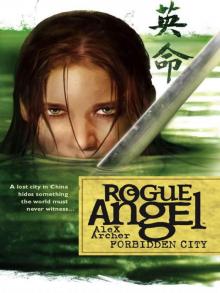 Rogue Angel: Forbidden City
Rogue Angel: Forbidden City The Spider Stone
The Spider Stone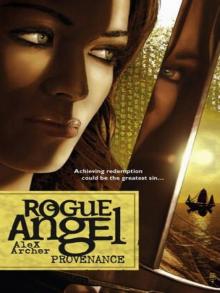 Provenance
Provenance Blood Cursed
Blood Cursed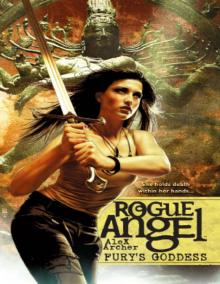 Fury's Goddess
Fury's Goddess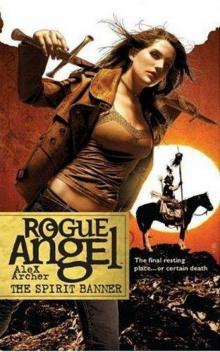 The Spirit Banner
The Spirit Banner Footprints
Footprints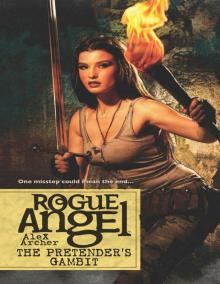 The Pretender's Gambit
The Pretender's Gambit Rogue Angel: The Lost Scrolls
Rogue Angel: The Lost Scrolls Staff of Judea
Staff of Judea Rogue Angel 55: Beneath Still Waters
Rogue Angel 55: Beneath Still Waters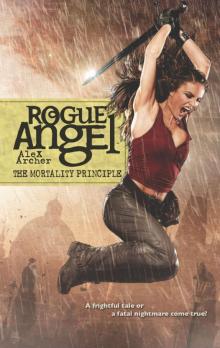 The Mortality Principle
The Mortality Principle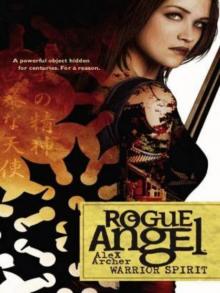 Warrior Spirit
Warrior Spirit Paradox
Paradox Tear of the Gods
Tear of the Gods Forbidden City
Forbidden City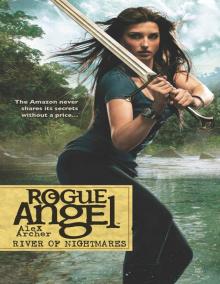 River of Nightmares (Rogue Angel)
River of Nightmares (Rogue Angel) Rogue Angel: The Secret of the Slaves
Rogue Angel: The Secret of the Slaves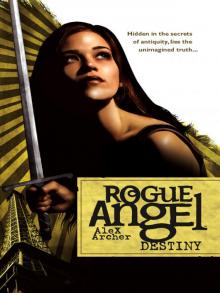 Destiny
Destiny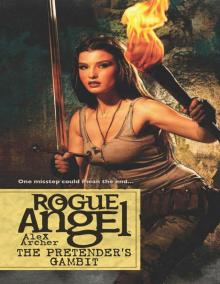 Rogue Angel 51: The Pretender's Gambit
Rogue Angel 51: The Pretender's Gambit Celtic Fire
Celtic Fire Rogue Angel 54: Day of Atonement
Rogue Angel 54: Day of Atonement Day of Atonement
Day of Atonement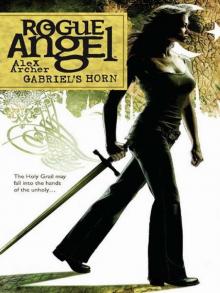 Rogue Angel: Gabriel's Horn
Rogue Angel: Gabriel's Horn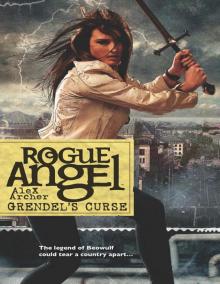 Grendel's Curse
Grendel's Curse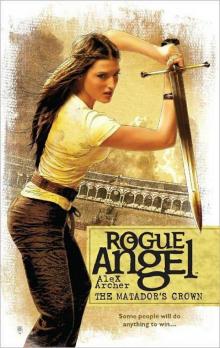 The Matador's Crown
The Matador's Crown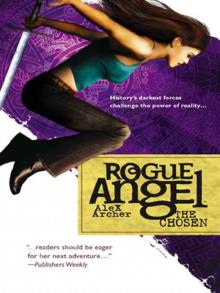 Rogue Angel: The Chosen
Rogue Angel: The Chosen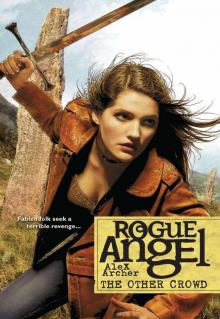 The Other Crowd
The Other Crowd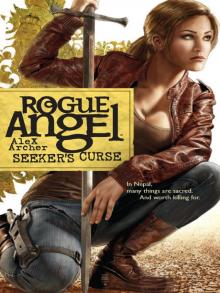 Seeker’s Curse
Seeker’s Curse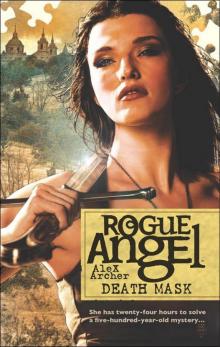 Rogue Angel 52: Death Mask
Rogue Angel 52: Death Mask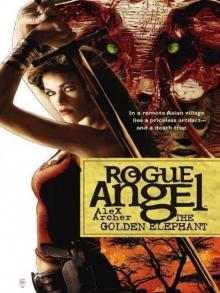 The Golden Elephant
The Golden Elephant Blood Cursed (Rogue Angel)
Blood Cursed (Rogue Angel) Celtic Fire (Rogue Angel)
Celtic Fire (Rogue Angel)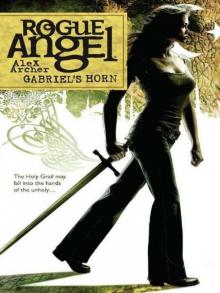 Gabriel's Horn
Gabriel's Horn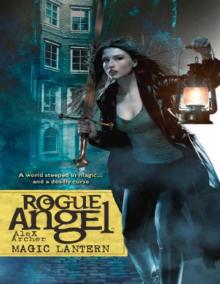 Magic Lantern (Rogue Angel)
Magic Lantern (Rogue Angel)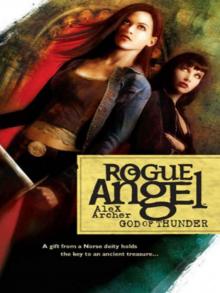 God of Thunder
God of Thunder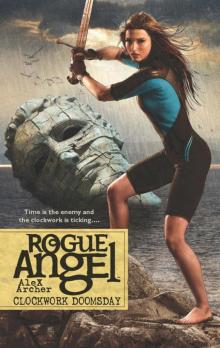 Clockwork Doomsday
Clockwork Doomsday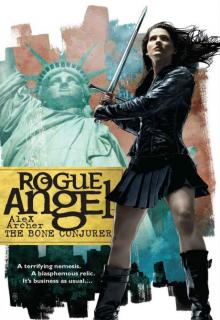 The Bone Conjurer
The Bone Conjurer Treasure of Lima
Treasure of Lima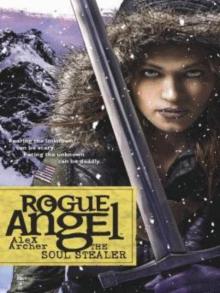 The Soul Stealer
The Soul Stealer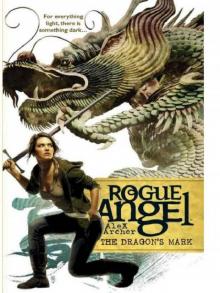 The Dragon’s Mark
The Dragon’s Mark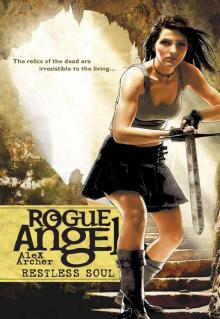 Restless Soul
Restless Soul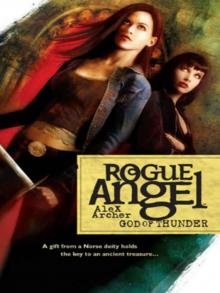 Rogue Angel: God Of Thunder
Rogue Angel: God Of Thunder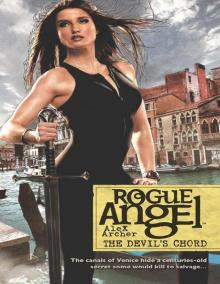 Rogue Angel 49: The Devil's Chord
Rogue Angel 49: The Devil's Chord Death Mask
Death Mask Rogue Angel 46: Treasure of Lima
Rogue Angel 46: Treasure of Lima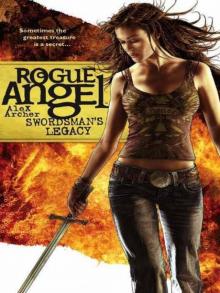 Swordsman's Legacy
Swordsman's Legacy The Oracle's Message
The Oracle's Message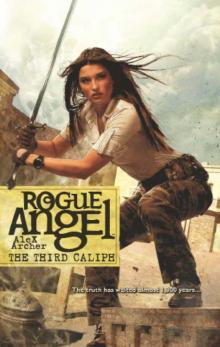 The Third Caliph
The Third Caliph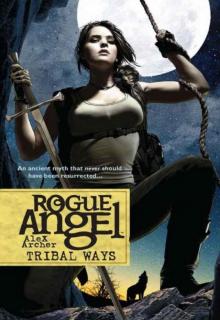 Tribal Ways
Tribal Ways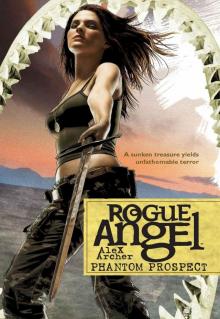 Phantom Prospect
Phantom Prospect Rogue Angel 50: Celtic Fire
Rogue Angel 50: Celtic Fire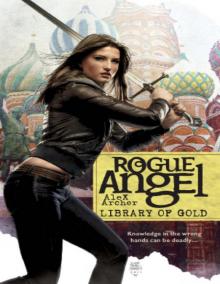 Library of Gold
Library of Gold Rogue Angel 53: Bathed in Blood
Rogue Angel 53: Bathed in Blood Sacred Ground
Sacred Ground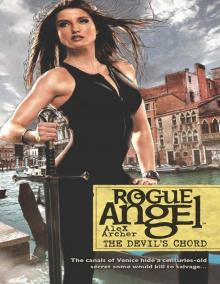 The Devil's Chord
The Devil's Chord Serpent's Kiss
Serpent's Kiss The Vanishing Tribe
The Vanishing Tribe Sunken Pyramid
Sunken Pyramid Sunken Pyramid (Rogue Angel)
Sunken Pyramid (Rogue Angel)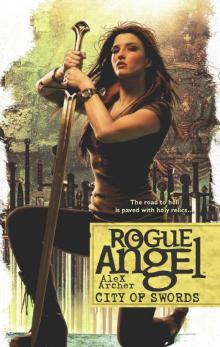 City of Swords
City of Swords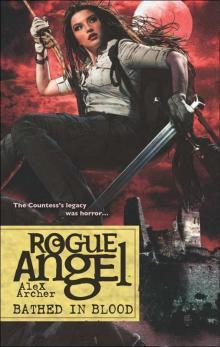 Bathed in Blood
Bathed in Blood The Lost Scrolls
The Lost Scrolls The Babel Codex
The Babel Codex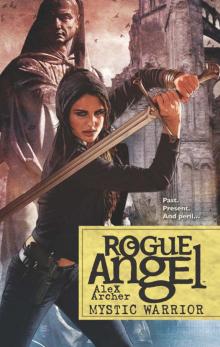 Mystic Warrior
Mystic Warrior Eternal Journey
Eternal Journey Beneath Still Waters
Beneath Still Waters Solomon's Jar
Solomon's Jar Beneath Still Waters (Rogue Angel Book 55)
Beneath Still Waters (Rogue Angel Book 55) Cradle of Solitude
Cradle of Solitude Secret of the Slaves
Secret of the Slaves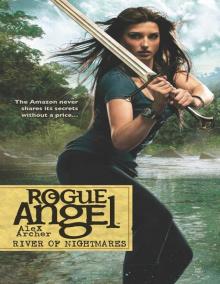 River of Nightmares
River of Nightmares Polar Quest
Polar Quest False Horizon
False Horizon